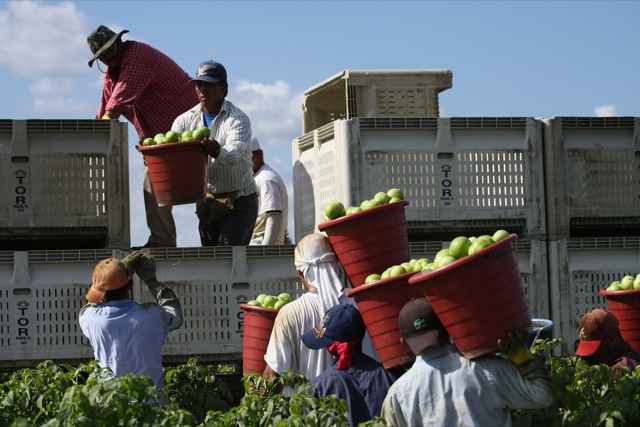A New Day in the Fields and at the UN

In the last 15 years, the modern UN Human Rights system has been forging an evolving consensus around the human rights obligations of private actors. Last year, the UN adopted Guiding Principles on Business and Human Rights, and launched a working group . That group culminated its first U.S. trip on May 1st by holding a press conference and issuing a statement. While the statement was sobering, there was one glimmer of light that warranted working group praise: the Coalition of Immokalee Workers’ Fair Food Program.
The UN Working Group on Business and Human Rights stopped in Florida, West Virginia, California, Arizona and New York, and met with the staff of the Tom Lantos Human Rights Commission and the Senate Foreign Relations Committee. Not surprisingly, it observed, “Significant gaps appear to remain in [government] regulation, oversight and enforcement in areas where business activities may adversely impact human rights.” The Group noted, “with concern, the exclusion of agricultural workers from the protection afforded to workers in other sectors through legislation such as the National Labor Relations Act.” They also found that among the business representatives with whom they met, “There was suspicion and even outright rejection of the human rights framework, particularly as it relates to labour rights, and the content of individual rights.”
In this context, its recognition of the Coalition’s program was all the more striking.
The Working Group was impressed by how such governance gaps relating to labour issues were addressed by the Coalition of Immokalee Workers (CIW), a multi-stakeholder initiative to enhance the working conditions of the largely immigrant workforce in the Florida agricultural sector. The CIW innovatively addresses core worker concerns, relies on market incentives for participating growers, and has an independent and robust enforcement mechanism. To overcome abuses in their industry workers, tomato growers and corporate buyers developed the Fair Food Code of Conduct setting-out minimum standards for workers and pay. We met participants who spoke of the advantages enjoyed by their business operations and workers who related the improvements in working conditions as a consequence of the scheme.
Coming on the heels of recognition by the UN Global Compact as a sustainable supply chain model, it should be obvious by now that the Fair Food Program (FFP) epitomizes the operational aspects of the UN Guiding Principles on Business and Human Rights. While the UN framework reaffirms state obligations to protect human rights from third party abuse, it operationalizes the corporate responsibility to respect human rights. This corporate commitment is to come from “the most senior level…informed by relevant expertise,” and is to be “publicly communicated… and reflected in operational policies and procedures.” The FFP is held together by a series of contracts, signed by corporate officers of food retailers and tomato growers, and its Code of Conduct is communicated via worker-to-worker, on-the-clock training sessions.
The UN principles require human rights “due diligence” by corporations, which involves actions to address “adverse human rights impacts that the business may “contribute to” which may be “directly linked to its operations by its business relationships.” The FFP is founded on the principle that corporate food giants like Taco Bell, McDonalds, Chipotle, Whole Foods, Trader Joes, and others bear a responsibility for what occurs in their supply chains, regardless of the legal distance they try to maintain.
The UN principles require meaningful consultation with affected groups and stakeholders and, where necessary, effective “non-State-based grievance mechanisms dealing with business-related human rights harms.” The FFP is such a private mechanism, and workers and growers in concert crafted its Code of Conduct.
Expressing savvy about the proliferation of industry-led or industry-dominated corporate responsibility schemes that currently litter the field of corporate social repsonsibility, the Guiding Principles actually set forth eight elements of an effective grievance system. The Fair Food Program meets all eight. It is legitimate, accessible, predictable, equitable, transparent, rights-compatible, informed by continuous learning, and based on engagement and dialogue with stakeholders.
Recognizing, perhaps, the tensions inherent in embracing an efficacious non-state mechanism in what has been, to date, an unabashedly state-focused human rights system, the Working Group added:
The merits of such a multi-stakeholder scheme are clear and have not required a government role, but the Working Group notes that the ultimate responsibility to ensure that rights are protected remains with the government. Concerted action by stakeholders in the tomato sector in Florida arose from two decades of campaigning even though the government was aware of the risks faced by workers.
Of course, the government has been aware of the risks faced by farmworkers since Congress excluded them from most labor law protections in the 1930s. But a new day has come to the tomato fields of Florida, courtesy of the workers themselves, and the consumers who allied with them. The FFP is deserving of this lofty UN recognition and, no doubt, will receive more when the Working Group issues its final report.
This is not good news for companies like Royal Ahold [Giant, and Stop & Shop], which joined the UN Global Compact in 2010, but has spent the last three years resisting FFP participation. The Global Compact was created in 2000, one of the first UN attempts to recognize that private businesses have human rights responsibilities. Since then, we have seen “fair trade” become “fair washing,” and gold standard social “certifications” go up in Bangladesh smoke.
The UN Working Group and indeed the human rights system is hungry to find robust protection mechanisms relative to corporations that are based on experience rather than hype, and that actually work for those who work. They have found one with the Fair Food Program, and a new day of business responsibility may be dawning.
